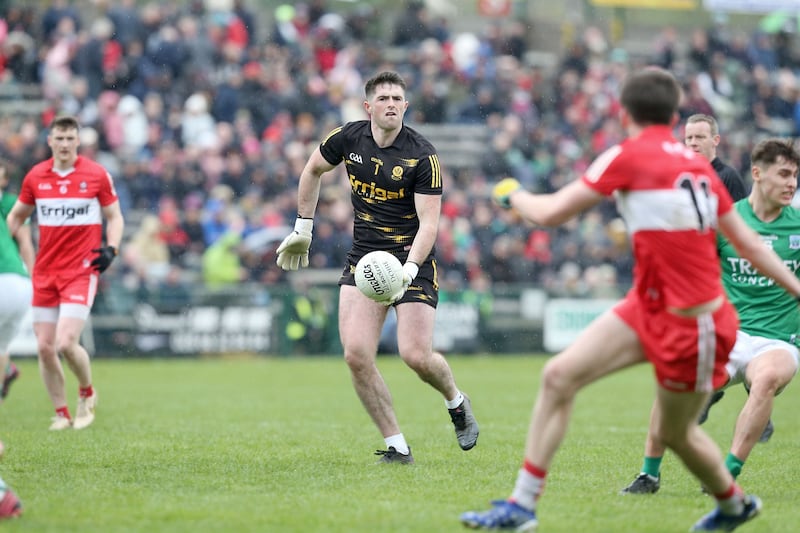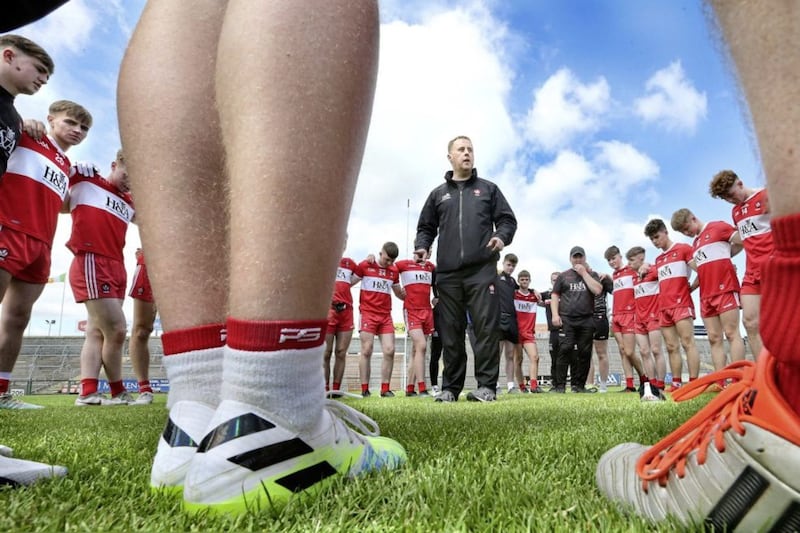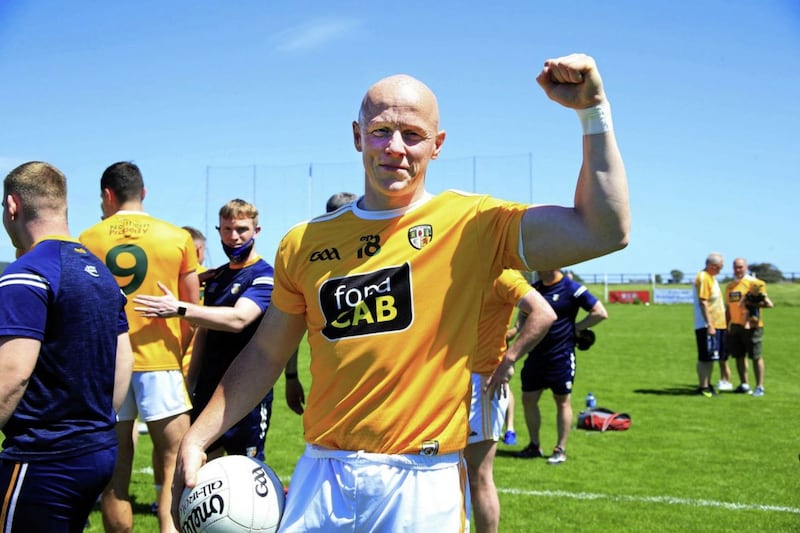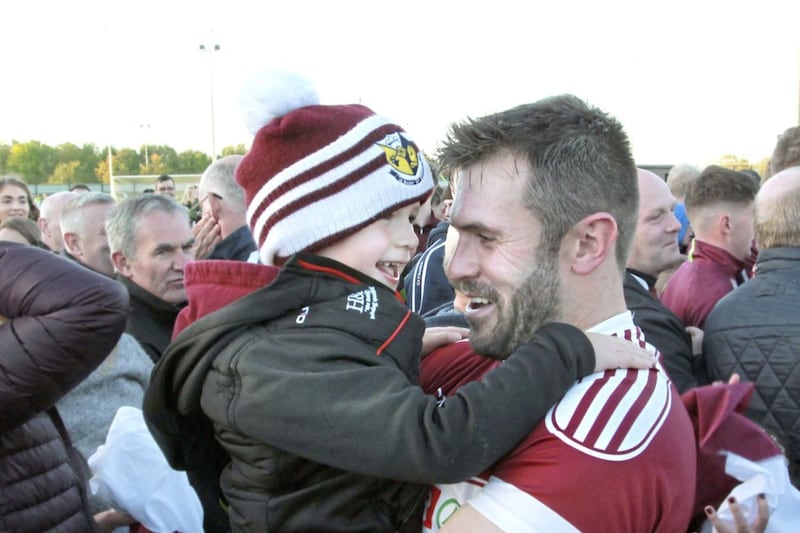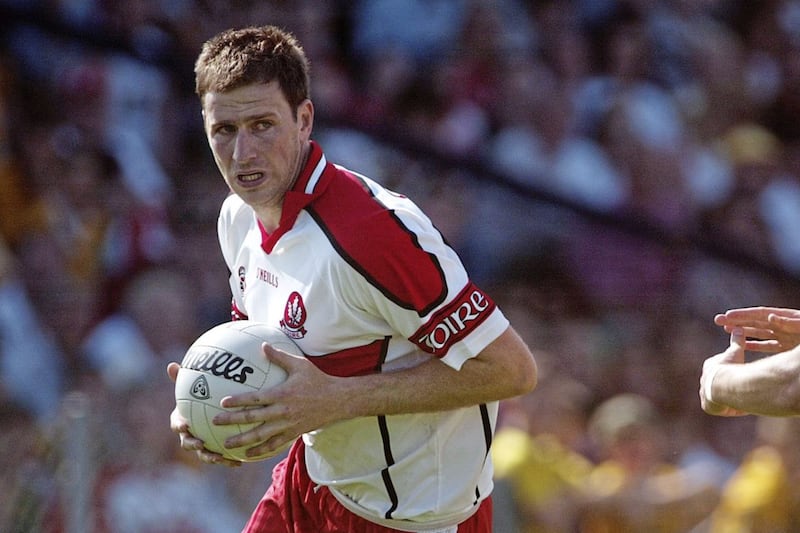GERARD O’KANE first encountered Mark Lynch in a primary school game back in the early 1990s.
O’Kane was a P6 with Glenullin and Lynch, a year younger, was a P5 at Fincairn. O’Kane was always struck by the odd-shaped pitch where Fincairn played their games: “It was like a diamond shape, almost like a baseball field,” the Glenullin man recalls.
“We used to play nine-a-side and Mark and me would always be marking each other.”
They were reacquainted in U12 games between Banagher and Glenullin. More often than not, O’Kane and Lynch would cancel each other out - even right through Sigerson football: “I was talking to Mark about this,” O’Kane says.
“I’ve played with him more than anyone else, except from someone from your own club.”
During their teens, O’Kane and Lynch were big noise in Derry circles. They teamed up together at St Patrick’s, Maghera, where they reached the summit of college football and likewise with the Oak Leaf minors in 2002.
“If you asked me about the happiest time we had, I’d say those six months from September ’02 to April ’03 when we won the All-Ireland minors, the MacRory Cup and Hogan Cup. It was a fairytale period,” O’Kane says.
The class of ’02 were a special crew: “We had a great spine,” recalls Paddy Crozier, a backroom team member of Chris Brown’s managerial team in 2002.
“Gerard O’Kane was full-back, Mark Lynch was centre half-back, Ruairi Convery and Patsy Bradley in the middle, Barry McGoldrick was there and Paul Young from the Loup."
Even though he was surrounded by quality, Mark Lynch still stood out like a sore thumb at number six: “Mark Lynch gave that minor team a real presence,” says Crozier.
“His long kick passing was brilliant. He could drive forward and finish with a score.”
O’Kane says: “I remember we came back to school the day after beating Longford in the All-Ireland semi-final knowing that day we had three weeks to prepare for an All-Ireland final.
"Three weeks after tha,t we were preparing for the MacRory Cup. They were two totally different styles of football. With minor football, we just went out and played, whereas MacRory Cup football was a lot more intense, probably because of the time of the year it was played. MacRory Cup football, pre-Christmas, wouldn’t have been aesthetically pleasing… MacRory Cup football, between 16 and 18, was where you broke through the mental barrier, the pain barrier…”
Lynch’s family were steeped in the GAA. Crozier says Mark was the double of his father Mickey on a football pitch. Strong, powerful, classy: Marked out as a star of the future, everyone expected Lynch to graduate with honours to the senior ranks.
“There are few Gaelic footballers in the country more genuine than Mark Lynch,” says former Derry senior manager Brian McIver.
“He’s a dream player to work with. I would have followed Mark’s progress from youth level and I always felt he was going to be a county player.”
O’Kane adds: “He played centre half-back in the minor team as a 16-year-old and it was at that time he came to national prominence. We had a very good team, so a few of us came to national prominence but he was the one because of the way he played football.
“He was classy looking. He had brute strength but he was also very classy. There were always big players at minor level but few of them could sell you a hand to toe dummy and they couldn’t play a 50-yard pass or kick the ball over the bar. Lynch had it all at that age. We came up through Maghera and did the same and people were saying then that when that boy hits 17 or 18 he’ll be centre half-forward for Derry.”
Mickey Moran gave Lynch his senior Championship debut during the 2004 campaign in which Derry reached the All-Ireland semi-finals. He came off the bench for Johnny Bradley in the Qualifier win over Limerick and Johnny McBride made way for the-then 18-year-old against Kerry.
It was the following season Lynch established himself as a regular fixture in Derry’s senior team. They swept aside Monaghan in their Ulster Championship opener in ’05 to set up a mouthwatering clash with defending champions Armagh.
“Lynch was number 11 and Kieran McGeeney was arguably at the peak of his powers for Armagh,” says O’Kane, who also played at Casement Park that day.
“A few weeks before we played our first Ulster Championship game against Monaghan. I mind chatting to my father. I said: ‘Kieran McGeeney will never be able to mark Mark Lynch’. Lynch had pace and power… I was thinking Mark Lynch will score 1-5 or 1-6 and go home.
“But I didn’t realise the step up to senior was going to be like. I was probably expecting too much of Lynch. Armagh beat us that day. Kieran McGeeney was one of the best defenders in the country then - and now I can see why.”
The following day, The Irish News player rating for Lynch read: ‘Was well marshalled by Kieran McGeeney. He struggled to get into the game... 6’
O’Kane adds: “I was naïve enough to think: ‘Mark Lynch will turn 18 and literally do what he wants at senior level’. Stuff like that doesn’t really happen. So he probably did feel pressure. It didn’t help that his father [Mickey Lynch] was a very good player for Derry.”
It was a tough baptism for the Banagher youngster. Despite having some of the best players in the country, Derry couldn’t put back-to-back Championship wins together in Ulster. Capable of taking out a big gun - as they did in 2006 by beating reigning All-Ireland champions Tyrone - Derry could never quite sustain a good enough run to win an Anglo-Celt Cup.
Between 2005 and '09 Derry lost in five Ulster semi-finals to different teams: “Derry had a team then with a lot of players at their peak,” laments O’Kane.
“Fergal Doherty, Enda Muldoon, Sean Marty Lockhart, Niall McCusker, Kevin McCloy, Kevin McGuckin, Johnny McBride… Lynch and me came on to that side and that team maybe should’ve had an Ulster Championship. But because you’re not setting the world alight as a team, personal accolades don’t fall your way either. So he lost out on that as well.”
While the rest of the country were decidedly agnostic about Mark Lynch’s true value, Derry’s congregation remained steadfast and evangelical of his limitless ability. He won a Sigerson medal with UUJ in 2008 and was still punching his weight when Derry clinched the NFL title that same year.
But Derry as a county couldn’t be trusted to produce the goods on the really big days. Lynch was a high-profile casualty of a team that underachieved on the provincial stage. Brian McIver took over the Derry senior team in 2013 and stayed at the helm for three years. He didn’t have as good a panel as Derry boasted in the mid-Noughties but he got the best out the mercurial Lynch.
Even though Derry endured a painfully truncated Championship campaign in 2014 - losing to Donegal and Longford - Lynch still gained an Allstar nomination: “That’s the thing about the Allstars,” says McIver, “you nearly have to be playing in the All-Ireland semi-finals or a final to win one…
“I had him captain for three years. He always gives you 100 per cent and he’s added that bit of maturity to his game. One of the problems with Mark was that you could play him in so many different positions. I had to drop him back into the sweeper’s role… but I played him centre half-forward as well.”
O’Kane feels that McIver and current manager Damian Barton have maximised Lynch’s strengths: “Brian gave him freedom to play,” says O’Kane.
“Damian has given him the same freedom but only further up the field.”
Now 30, Lynch is playing some of the best football of his career with Derry. He showed his star quality in recent Qualifier wins over Meath and Cavan. Barton will look for more of the same against Tipperary on Saturday.
It reached the stage against Cavan last week that once he took aim you knew the ball was sailing between the posts. Named at number 15, Lynch has licence to roam in the Derry attack - but rarely leaves the scoring zone.
“Where he’s playing now he has the freedom to come out the field and get on the ball,” says McIver.
“The fact that he’s so accurate from play, you want to get him in positions to make the best of that. Playing from the ’45 in suits him and certainly suits Derry. I felt he was under a lot of pressure last year because we were forced to play him in so many different positions.
"And because of injuries and one thing or another we were forced to play him in the middle of the field for a time and, really, Derry needed him playing centre half-forward and full-forward. Thankfully that’s no longer the case and he’s getting to play in a particular role and he’s playing really, really well again.”
Judging by McIver and Crozier’s accounts, Lynch is a dream to manage. Low maintenance - high output. Crozier describes him as “the ideal footballer”: “He’s played in nine different positions for Derry over the years. He has shown great leadership over the last number of weeks,” says former senior boss Crozier.
“Some of the scores he’s got over the last number of weeks, when Derry needed them most, he was there. He’s one player that would have got on any Derry team in the history of Derry football and he is one player who would have got on any team in Ireland.”
Lynch has never courted publicity or the limelight during his long association with Derry. He’d rather side-step reporters after games but is much too polite to do so. Former Irish News sports journalist and Derry PRO Chris McCann tells the story: “I asked Mark to get me a jersey for my niece. He got her one he wore in a Qualifier against Cavan [a few years back].
“He'd scored seven points in the game but it was one we'd lost so he decided that wasn't enough. As well as that match jersey he also gave her the jersey he got for being Footballer of the Month when Derry beat Dublin and reached the National League final."
Lynch mightn't have done many interviews over the years - but he leaves a rich archive. Between the white lines. Where it matters...


